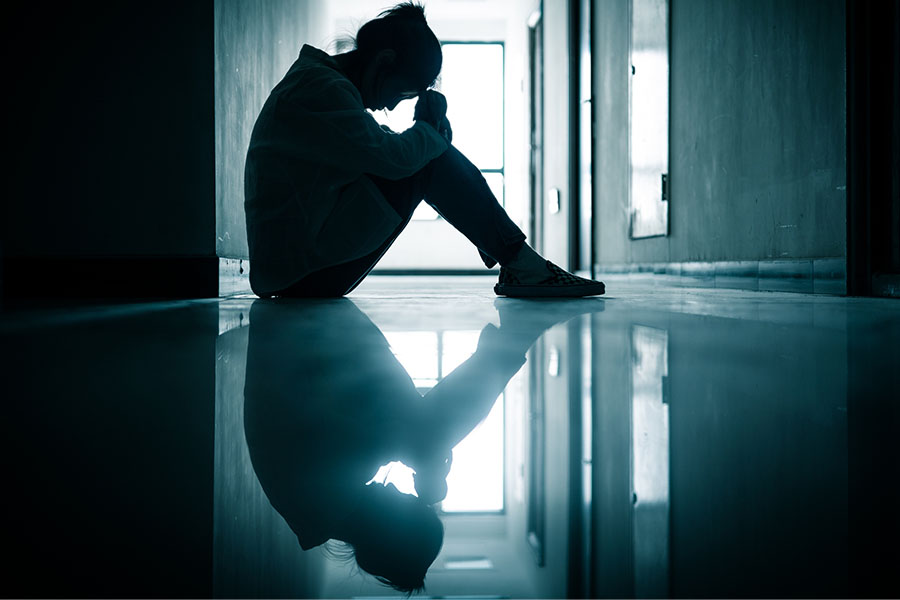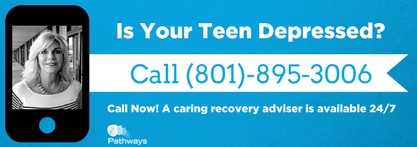 Teen depression is a serious condition that can affect various aspects of your teen’s life and it can turn out to be catastrophic if the child doesn’t receive prompt treatment. At Pathways Real Life Recovery, we understand teen depression can come from chemical imbalances in the brain, hormonal changes, medications or other things happening in a person’s life.
Teen depression is a serious condition that can affect various aspects of your teen’s life and it can turn out to be catastrophic if the child doesn’t receive prompt treatment. At Pathways Real Life Recovery, we understand teen depression can come from chemical imbalances in the brain, hormonal changes, medications or other things happening in a person’s life.
If you feel like your child is depressed, then we are here to help you. Pathways offers teen depression treatment services that allow our adolescent clients to express their needs, fears, and concerns. We have a team of experienced doctors that will help your child overcome teen depression and start living his/her normal life. We will develop an appropriate treatment plan for your kid. Contact us today to get quality help with treating your Teenager's depression in Utah.
Depression in Teens
Teen Depression is a severe mental disorder that lasts for at least two weeks which invokes feelings of irritability, persistent sadness, or hostility. Depression is more than the usual sadness or moodiness. Specific genetics can make young people more vulnerable to depression, but in most cases, teen depression is triggered by stressful situations such as substance abuse in the family, bullying, divorce, trauma, and or the social settings in a school. When things go wrong, teenagers tend to react differently. Unrealistic social, family and academic expectations can create a strong sense of rejection among young people which led to deep disappointment that eventually result in depression.Types of Teenager Depression Disorders
It may not be easy to tell when your child is experiencing depression. Some of the common teen depression disorders include:- Disruptive Mood Dysregulation Disorder: Some of the common symptoms of this disorder include aggression, irritability, and frequent physical and verbal resistance. The teen exhibits consistent signs of unhappiness, hopelessness, disinterest, and worthlessness. At this point, the teenager is forced into thinking about suicide.
- Premenstrual Dysphoric Disorder: This disorder is mostly associated with the hormonal changes that occur before a menstrual cycle and a few days after the start of menstruation, and they will be gone immediately the period ends.
- Major Depressive Disorder: With this type of disorder, the depression can last from the two-week period to several years with frequent reoccurrences. The teenager will display a significant change in their mood and loss of interest in some of the activities they considered a hobby. In most cases, the primary depressive disorder is treated as a long-term condition.
- Adjustment Disorder: This is short-term and stress-related, and it will mainly occur within three months of an event. Teenagers with this type of disorder will experience poor performance in school, irritable mood, and sleep disturbances. The depression could just be an adjustment from moving to a new town, financial difficulties within the family, break up with a close friend or coping with a divorce of the parents.
- Persistent Depressive Order: This type of depressive disorder is sometimes referred to as dysthymia. Although it’s less severe, it is a more chronic form of depression. A persistent depressive disorder can prevent the teen from living life to its fullest and cooperating in performing the daily activities as expected.
If Your Teenager is Showing Any of the Signs of Teen Depression, Call Pathways Real Life Recovery at: (801) 895-3006 Before the Depression Becomes Worse

Signs & Symptoms of a Depressed Teen
Statistics from the National Survey on Drug and Health indicate that at least 8.2 percent of children aged between 12 and 17 years suffered from depression in 2011. However, most of these teenagers didn't receive treatment. This shows the importance of recognizing depression symptoms and warning signs in teenagers; otherwise, it's most likely that the minor will not receive any help. Knowing the common signs of depression in teens will help a parent identify the problem early enough and take the right steps. Here are the most common symptoms and warning signs of depression among teenagers.- Social withdrawal: Socializing is always one of the critical aspects of any teen's life. But if your child's social circle has shrunk rapidly, then this may be a clear sign of depression. Although teens may keep some friends even when they are depressed, unlike adults, if there is a rapid reduction in the number of friends the teen is socializing with, then it is a critical warning sign that you should be aware of.
- Irritability, Feelings of Hopelessness, and Uncontrolled Anger: The myth that a depressed teen will always be quiet and unconcerned with what is happening around him/her is untrue. In fact, a depressed teen displays dominant emotions of irritability and anger. In most cases, teens and especially boys, who have been victims of bullying, may become extremely aggressive and violent. Sometimes the minor may also show a pessimistic view of life or the world. Hopelessness is a critical warning sign of depression.
- Changes in Their Sleep Patterns: Most teens who are depressed tend to become active at night, and this may push them to a point where he/she may struggle to wake up for school in the morning. They may also want to do nothing but sleep all day. If you recognize excessive tiredness in your child early in the morning, then ask him/her if she is having trouble sleeping at night and try to determine the cause of the problem.
- Abrupt Loss of Interest in Sports: If your child has been enjoying playing football or participating in athletics but abruptly loses interest in such activities, this could be an indicator that he/she is stressed. Although changing interests is normal, it has to be gradual and not abrupt.
- Becomes Sensitive to Criticism: Although minors tend to display exaggerated reactions to certain situations, being overly sensitive to common criticism is an indicator that the minor is depressed. Being oversensitive could be a sign that your child is feeling low and something is wrong.
- Problems at School: Depression can result in low energy and concentration difficulties which may lead to poor attendance and performance at school. Sometimes, a student who has always scored good grades may suddenly start being frustrated with schoolwork.
- Low-Self-Esteem: Depression has a way of triggering or intensifying feelings of failure, shame, unworthiness, and ugliness among teenagers.
- Drug and Alcohol Abuse: When things get worse, affected teens usually turn to drugs and alcohol as a way of self-medicating against the evident effects of depression. However, substance abuse can only make things worse.
Suicide Warning Signs to Watch for in Depressed Teenagers
In most cases, teens who are severely depressed and abuse drugs may decide to commit suicide as a way of solving their problems. They often think about or make attempts to take away their lives, and unfortunately, the number of successful suicide attempts among teens is on the rise. You should act swiftly and talk to a teen depression expert if your child shows any of the following suicide warning signs in depressed teens.- Giving away their most treasured possessions
- Writing stories or poems about death or suicide
- Talking about committing suicide
- Saying goodbye to family members and friends as if it is the last time they see each other
- Pronouncing terms such as "there is no way out," "I'd better die," or “I wish I could leave forever."
- Engaging in reckless behavior without care
- Speaking positively about suicide or death
How to Help a Depressed Teenager Self Help
If you suspect that your child is depressed, then raise your concerns in a loving and caring manner to determine the cause of the depression. Even if you’re in doubt whether it’s depression, talk to him/her and address the problem. Open up and let your kid know that there are specific worrying signs that you’ve noticed, and you feel something is wrong then ask the child to share what he/she is going through with you. Hold back from asking a lot of questions and be ready to listen.- Open the Right Channels of communication: In your dialogue with your young, focus on listening and not lecturing. You should try to resist any urge of criticizing or being judgmental once your kid opens up. The most important thing is that your child is communicating how they feel and the best thing you can do is to let the teen understand that you are always there for him or her, fully and unconditionally. Acknowledge how they feel and don’t try to talk your child out of depression even if you think that their feelings or concerns are silly.
- Encourage Social Connection: More than 90 percent of depressant teens tend to withdraw from their close friends, family members and even the activities that they used to enjoy. However, isolation only makes the depression worse. The best thing you can do at this stage is helping your kid reconnect. Set aside a fraction of time each day when you are just focused on your young one without any distractions. The simple act of connecting face to face with your kid can play a crucial role in reducing your child's depression.
- Encourage Your Child to Volunteer: One of the most potent antidepressants and self-esteem booster id doing things for others. You can help your kid find a cause that he/she is interested in and which gives him/her a deep sense of purpose. If it is something that you can do, then you should spare some time and volunteer with them since it offers a perfect opportunity for deep bonding.
- Prioritize Physical health: Physical and mental health is deeply connected. Depression can sometimes be as a result of poor nutrition, inactivity, or inadequate sleep. Most of the teens usually have unhealthy habits such as eating a lot of junk food, staying awake up to late, and spending long hours on their smartphones. All these behaviors can lead to depression. As a parent, you can help combat some of these bad habits by fostering a healthy and supportive home environment. You can achieve this goal by providing nutritious and well-balanced diet, setting limits on screen time and involving the kid in some light physical activities at home. You should also encourage your child to have a plenty sleep for at least nine hours per night.
- Seek Professional Help: Don’t hesitate to take your kid to a teen depression treatment center in Utah when the conditions of depression become worse. We have a team of well-trained professionals with a strong background in handling depressed teens.
Teen Depression Treatment Options To Help a Teenager With Depression in Utah
Once you bring your teen to our rehab for depression and anxiety, we undertake a series of evaluations that help our treatment team better understand the teen depression disorder or depression. The purpose of the assessment is to determine whether the child has attempted any forms of self-medicating. The results of the evaluation provide a bigger picture of the condition of your teenager and will prepare our medical treatment to fight with any other co-existing disorders. We will then come up with a comprehensive treatment plan based on the evaluation results to help you young ones regain his/her normal life. Our treatment options include:- Interpersonal Therapy: This aspect of treatment primarily focuses on assisting the teenager to develop healthier relationships with the other people both at home and at school.
- Psychotherapy: In our psychotherapy program, we offer teens brilliant opportunities to explore events and feelings that are painful or troubling them. The purpose is psychotherapy is teaching the teenagers how to cope with such feelings and thoughts.
- Cognitive-Behavioral Therapy: This type of therapy is focused on helping the teens change negative patterns of thinking and behavior.
- Medication: Medication isn’t always used in dealing with teen depression treatment, but it is still an option. Medication seeks to manage other symptoms that the teen may be showing effectively. Medication is eased out of the system as the teenager learns coping mechanisms. However, the use of medication such as antidepressants may allow for proper care.
Pathways Real Life Recovery - Teen Depression Treatment Utah
At Pathways Real Life Recovery in Sandy, Utah, we offer effective counseling and therapy that will help your child accept who they are to make a positive change in their lives.
We treat all our clients with love, dignity, respect and ensure that your loved one receives the much-needed support, training, and guidance. You won't reach a recording or answering machine when you call Pathways Real Life Recovery. Our staff members are available 24-hours a day to help.


